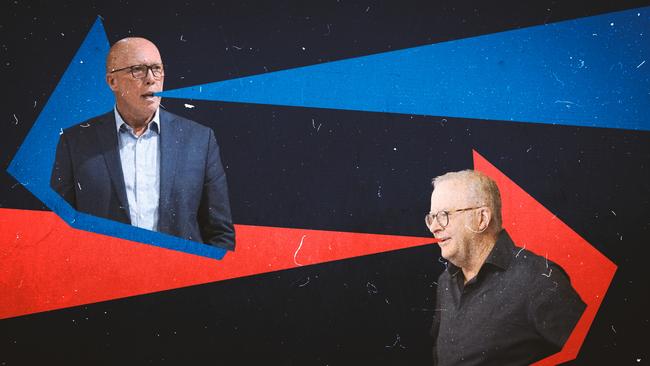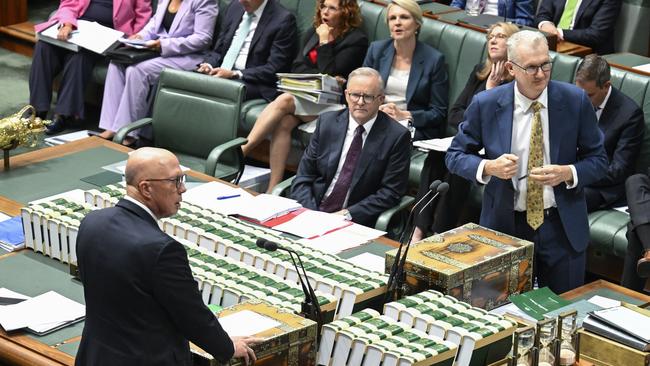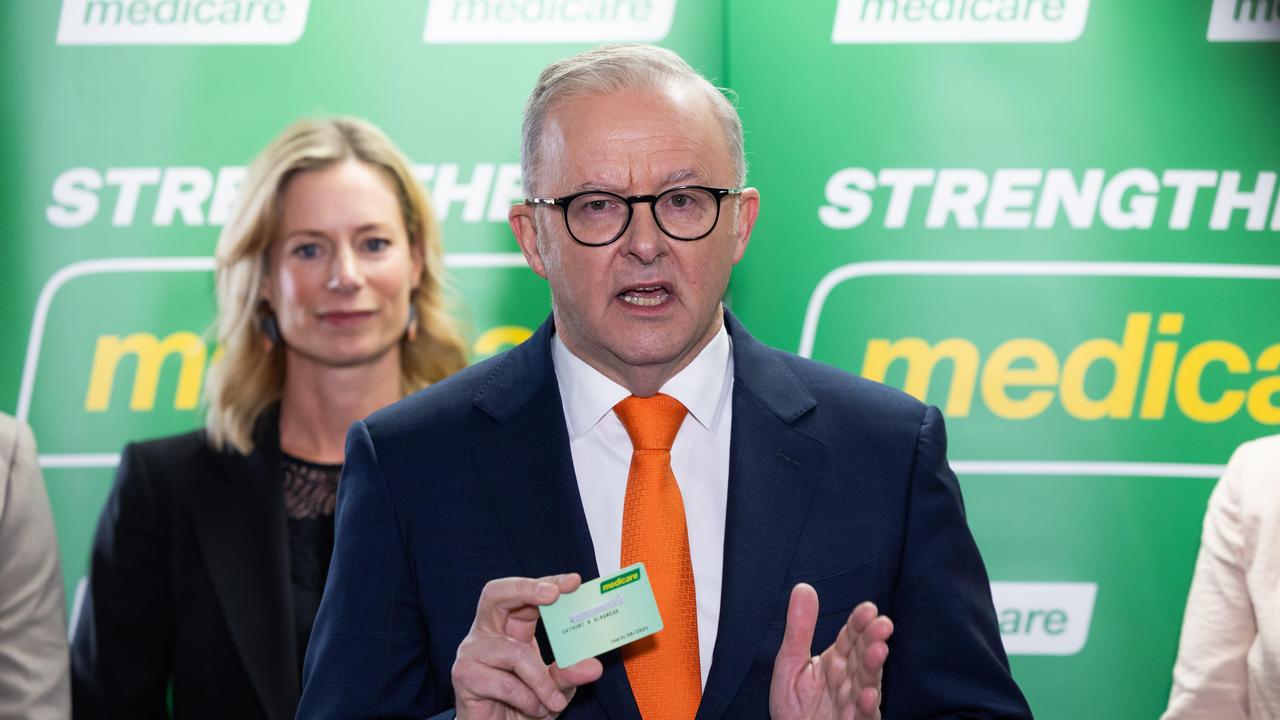Anthony Albanese v Peter Dutton: a tale of two expectations
Labor started this week with its best performance in months, but the PM is still looking like a loser trying to look like a winner while his rival battles the opposite problem.

Obviously, as the incumbent, Albanese has more to lose and no government wants to go to the polls with voters thinking they can’t win. However, Dutton, with nothing to lose, has already started to address dangerously great expectations.
Both need to address these crucial electoral indicators that can cement negative attitudes or breed complacency long before voters start to engage in an election campaign and make a final choice.
Public expectations have a direct effect on political fundraising, morale within the party and willingness to work from volunteers. For instance, the prospect of the Labor minority government relying on the support of the Greens to stay in power is a frightening vision for various industry groups, which act without ideology or party loyalty and consider a Labor majority government – as much as they may not like it – preferable to a minority Labor government answerable to the Greens.

This outlook can also work in the Coalition’s favour, with donors thinking a Liberal majority government would be preferable to both the Labor alternatives if a Greens-run Labor government is the most likely outcome.
This is despite the historical imperative against removing first-term governments and any misgivings about the inexperience of the Coalition frontbench. For so many reasons the Greens have become toxic to large sectors of the Australian community and the ALP’s ideological alignment with the minor party on so many issues spreads that toxicity to Labor.
There is no doubt that Albanese’s personal popularity and his rating as Prime Minister have fallen while Dutton has picked up in popularity and standing as a preferred PM. Momentum, despite an Albanese blitz in early January criss-crossing the continent and spending a billion dollars a day, is with the Coalition.
There has been a general shift in expectations during the first term of the Albanese government, starting with no thought of defeat in the first 18 months, then a movement towards perhaps losing a majority and having to form a minority, to the Coalition becoming favoured for a win in betting markets.
On Friday, Albanese was faced with his most aggressive interview on the ABC in Alice Springs in which he was told “he was on the nose”, seeking to be the “underdog” and in danger of losing both Labor’s Northern Territory seats of Solomon and Lingiari.
Albanese angrily reacted to the suggestion he was seeking underdog status, claimed the ABC was verballing him and declared: “I’m confident that we will form a majority government after the next election.”
But Albanese’s visit to Alice Springs looked like he was in trouble in the Top End, he was following Dutton’s footsteps and picking up Coalition policy on an audit of Indigenous spending. When a Labor leader is told on the ABC he’s “the problem” and a first-term government could lose, it’s a real problem with perceptions.

As the parliamentary sittings began this week for the election year, Labor started with its best political performance for months after Jim Chalmers cleverly ambushed Dutton and the opposition over their policy to reintroduce tax breaks for business lunches designed to appeal to small business and the hospitality industry.
The Treasurer’s experience in media and politics while working for Wayne Swan in the Rudd-Gillard days ensured the opposition was caught flat-footed having to deal with “Treasury analysis” suggesting the policy would cost taxpayers from $1.5bn to $10bn compared with the estimate of opposition Treasury spokesman Angus Taylor of “less than $250m”.
Albanese and Chalmers made hay out of the huge numbers and delivered punchy one-liners about the Liberals cutting workers’ wages to pay for their bosses’ free lunches.
“The policy that they’re trying to inflict on the Australian people would have workers shout lunches for their bosses and would smash an up to $10bn hole in the budget as a consequence,” Chalmers chortled.
“Only the Liberal and National parties could see taxpayers and workers funding between $1.6bn and $10bn to shout their bosses’ lunch as an issue of fairness. Only those opposite could see that as an issue of social justice and an issue of fairness,” Chalmers said.
That the figures seemed outlandish and were, as Taylor said, the result of a “politicisation of the public service” didn’t matter a great deal in the race to grab headlines and punchlines in Labor’s growing class warfare and scare campaign about budget and Medicare cuts.
Labor looked confident and successfully aggressive.
As part of the offer to ease cost-of-living pressures, Albanese announced a $1.7bn package for healthcare in the states as a positive front for his negative attack on Dutton over Medicare and a revisiting of past scare campaigns.
Unfortunately for Albanese, it was a moment of political sunshine that didn’t last and, once again, Labor’s attempts to concentrate on its rebates and cost-of-living relief was short-lived as Dutton shifted the agenda back to law and order and national security.
Albanese knew he would face questions about the discovery of a caravan laden with explosives in Sydney’s west and that he was kept in the dark for 10 days about its existence despite NSW Premier Chris Minns being briefed by security agencies the day after it was found.

What the PM knew and when he knew about the security threat at the height of a violent anti-Semitic campaign became inevitable questions he would not or could not answer. Another deadly distraction for Labor on national security and law and order.
Deflecting questions about what he knew, Albanese struck out against Dutton and said: “You know what the Australian people want to know? They want to know who’s behind this. They want to know who is engaged in anti-Semitic attacks. They want to know if people have been paid. They want to know where that trail leads.
“They want intelligence agencies to be able to do that work without political interference and without political gains. That is what they want here. But the priority of those opposite is to play political games,” he said.
But what was even worse for Labor was a sudden capitulation, again to a Dutton agenda, as the government introduced mandatory sentencing for hate crimes after staunchly opposing them – in keeping with official ALP policy.
Albanese’s response to the shift in perception since the May 2022 election is to tell Labor supporters not to worry and confidently declare he will win the election and be returned with a majority government.
Although there are obvious concerns within Labor ranks about falling public support and an almost universal acceptance that Labor will slip into minority government, relying on the Greens’ and Climate 200 teal independents’ support, Albanese is steadfastly optimistic.
On Tuesday, his first address to his Labor parliamentary colleagues this year, he declared: “We begin 2025 with a great sense of optimism. Inflation is down, wages are up, unemployment is low – indeed, our average rate of unemployment is the lowest that it has been in many decades going back more than 50 years”.
This is a brave face trying to convince others – some with their own hard-headed appraisals – that Albanese can turn the tide and avoid the greatest fear of ALP supporters, business and industry of a Labor minority government dependent on Greens and independents. On the other side, Dutton’s quest to quell unrealistic expectations has to be like Goldilocks seeking a “just right” balance between optimistically telling Liberal voters he can win but not creating an atmosphere of smug victory assumptions and complacency.
As the incumbent leader with a slim majority, behind in the polls, losing momentum to Dutton and facing voters within months, Albanese clearly has the bigger problem simply because Labor has more to lose.
But Dutton, who has to win 21 seats to govern absolutely in his own right, faces the same challenge. The Liberal leader has had the pressure-relieving advantage of being the underdog since the election with little expectation of defeating a first-term government for the first time in 100 years.
But polling and betting markets have thrust Dutton towards the impossible, forcing him to dampen expectations.
“We have an enormous job between now and the election, he said on Thursday.
“A first-term government hasn’t lost since 1931, and the unions will unleash millions of dollars of spending. The CFMEU, despite what they say, will put money into third party campaigns and it’ll be tough,” he said, but went on to offer hope.
“I think we can win the election because of a number of reasons. One is that I think we’ve demonstrated to the Australian public over the last two and a half years that we have been a united team, we look like a credible alternative government, we’ve put pressure on a bad government, we’ve come up with policies, and we’ve worked very hard over the last two and a half years to put the policies together,” Dutton said.
“So are we the underdog in this campaign? Absolutely we are,” he said.
“But I want to win this election because I want to help families, I want to help small businesses – 27,000 small businesses have closed over the course of the last couple of years. Behind every story, there’s a family who’ve lost their home, or lost their savings, employees who have now had to find work elsewhere,” he said.
Albanese is looking like a loser trying to look like a winner and Dutton is looking like a winner who wants to be a loser.
But they both want to be winners on election night.






Anthony Albanese and Peter Dutton have big problems with voters’ expectations for the next election: for the Prime Minister it is public polling showing more people expect him to lose, and for the Opposition Leader it is polling showing more people expect him to win.